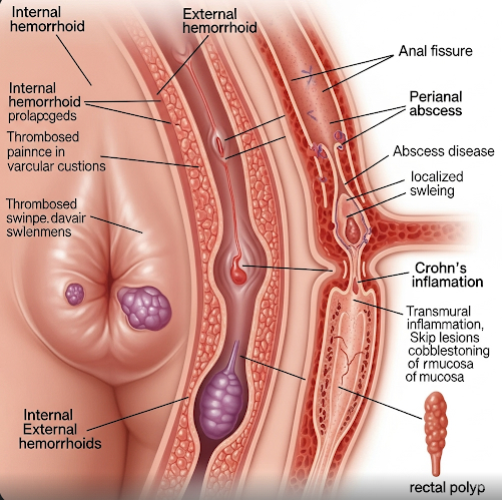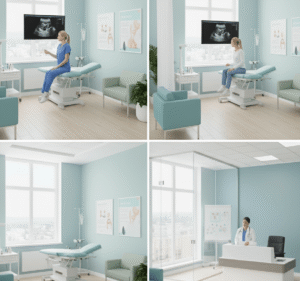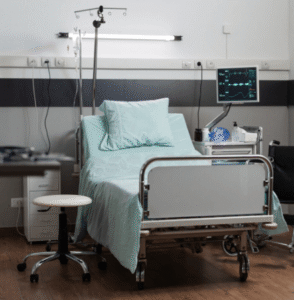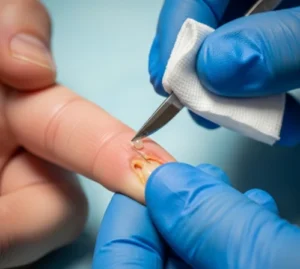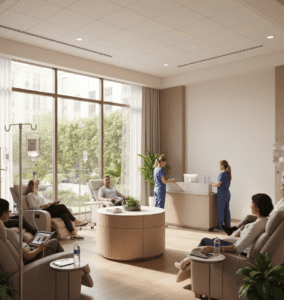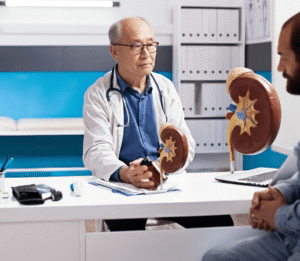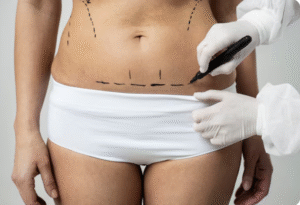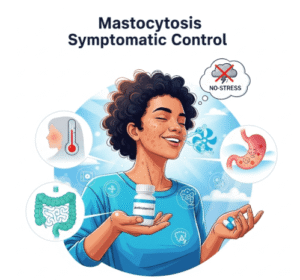Overview
Rectal diseases encompass a variety of conditions affecting the rectum—the last part of the large intestine before the anus. These diseases range from benign issues like hemorrhoids to serious conditions such as rectal cancer, each requiring appropriate diagnosis and management.
What Are Rectal Diseases?
Rectal diseases include a spectrum of disorders affecting the rectal mucosa, muscles, and surrounding tissues. Common diseases include hemorrhoids, anal fissures, rectal prolapse, rectal abscesses, and rectal cancer.
Common Symptoms
- Rectal bleeding or blood in stool
- Pain or discomfort during bowel movements
- Itching or irritation around the anus
- Mucus discharge
- Feeling of incomplete evacuation
- Lumps or swelling near the anus
- Changes in bowel habits
Common Causes
- Increased pressure in the rectal veins (hemorrhoids)
- Trauma or straining during bowel movements
- Chronic constipation or diarrhea
- Infections causing abscesses or inflammation
- Tumors or polyps
- Weakening of pelvic muscles (rectal prolapse)
Risk Factors
- Sedentary lifestyle
- Low fiber diet causing constipation
- Pregnancy and childbirth
- Aging and weakening of tissues
- Chronic diarrhea or inflammatory bowel disease
- Smoking and poor hygiene
Complications
- Persistent pain and bleeding
- Infection and abscess formation
- Stricture or narrowing of the rectal canal
- Fistula development
- Progression to cancer in some cases
Prevention
- High-fiber diet and adequate hydration
- Regular exercise to improve bowel function
- Avoiding prolonged straining during defecation
- Maintaining good anal hygiene
- Prompt treatment of infections and inflammations
Treatment Options in Korea
Korea provides comprehensive care for rectal diseases including:
- Medical Management: Topical treatments, stool softeners, and antibiotics for infections.
- Minimally Invasive Procedures: Rubber band ligation, sclerotherapy, or infrared coagulation for hemorrhoids.
- Surgical Interventions: Hemorrhoidectomy, fistulotomy, or rectal prolapse repair as needed.
- Advanced Diagnostics: Colonoscopy, anoscopy, and imaging for accurate diagnosis.
- Rehabilitation and Lifestyle Counseling: Diet and lifestyle modifications to prevent recurrence.
- Integrative Medicine: Use of Korean traditional medicine and acupuncture for symptom relief.
Korean colorectal specialists offer patient-centered care tailored to the type and severity of the rectal disease, ensuring effective treatment and improved quality of life.

